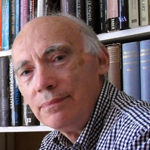Tim Bliss
October 2011 Honorary Degree Recipient

Doctor of Laws (honoris causa)
‚ÄúAs long as our brain is a mystery, the universe ‚Äď the reflection of the structure of the brain ‚Äď will also be a mystery.‚ÄĚ
These words come from Nobel Prize winner Santiago Ram√≥n y Cajal, who has been called the ‚Äúfather of modern neuroscience.‚ÄĚ They speak to the complexity of the human mind. They also underline the incredible importance of understanding these complexities.
British neurophysiologist Dr. Tim Bliss has made a tremendous contribution to this understanding, and it is our privilege to have him with us today.
Dr. Bliss is recognized worldwide for his pivotal research on the neural basis of learning and memory. In the late 1960s he collaborated with Terje L√łmo in the Oslo laboratory of Per Andersen. The 1973 paper he and L√łmo co-authored on what is now called Long-Term Potentiation ‚Äď or LTP ‚Äď established the most widely-studied experimental model of how the brain stores memories. LTP was a truly groundbreaking discovery. It is now known to be key to our understanding of learning, memory and the brain‚Äôs ability to change in response to new conditions.
Dr. Bliss, who holds undergraduate and doctoral degrees from McGill University, continues to research different dimensions of LTP. His work has appeared in many publications, including the Journal of Physiology; Neuroscience; and Neuron. He was an editor of The Hippocampus Book, which won the Association of American Publishers’ 2007 professional and scholarly publishing division award for biomedicine and neuroscience.
LTP‚Äôs importance continues to be reflected in thousands of papers that have been written on the subject. Yet, even with knowing so much, many questions still remain unanswered. In an article Dr. Bliss co-authored in Nature, he concluded that: ‚Äú. . . it is the nature of the link between LTP and memory that is likely to provide a major focus for research in the future.‚ÄĚ
For more than 40 years, Dr. Bliss has been affiliated with the British Medical Research Council National Institute for Medical Research. He joined the institute in 1967 and became head of the division of neurophysiology in 1988. He went on to become head of the neurosciences group. Though he retired from that role in 2006, he is still involved with the division of neurophysiology. Őż
Here at AVĺ„ņ÷≤Ņ, we are proud of our long-standing association with Dr. Bliss. He knows well the influential work of psychologist and AVĺ„ņ÷≤Ņ graduate, the late Dr. Donald O. Hebb, considered by many as the father of neuropsychology, and a man Dr. Bliss met here on campus.
Dr. Richard Brown, a AVĺ„ņ÷≤Ņ Research Professor, explains that Dr. Hebb was professor emeritus in our psychology department when Dr. Bliss came to the university as a lab researcher in the early ‚Äė80s. For nearly two decades now, Dr. Bliss and Dr. Alan Fine ‚Äď Director of AVĺ„ņ÷≤Ņ‚Äôs Neuroscience Institute ‚Äď have collaborated, and we‚Äôve been privileged to have Dr. Bliss visit AVĺ„ņ÷≤Ņ many times.ŐżŐżŐżŐż Őż
Dr. Bliss’s contributions to neuroscience have been justly appreciated. He is a fellow of the Royal Society and of the Academy of Medical Sciences. In 1991, he received the Bristol-Myers Squibb Award for Distinguished Achievement in Neuroscience Research, which he shared with Nobel laureate Dr. Eric Kandel. In 2012 he will deliver the Royal Society’s prestigious annual Croonian lecture.
Dr. Bliss contributes expertise and insight to a number of scientific committees. What’s more, he shares his many gifts with the next generation of neuroscientists.
In nominating Dr. Bliss for an honorary degree, Professor Richard Brown wrote: ‚ÄúHe is also a wonderful person, who radiates warmth and good humour. He has been a mentor to many students and post-doctoral fellows and is beloved by all of them.‚ÄĚ
For all he has done to illuminate and advance the world of neuroscience and for sharing this understanding with others, I ask you, Mr. Chancellor, in the name of the Senate, to award Dr. Tim Bliss the degree of Doctor of Laws, honoris causa.
Őż
